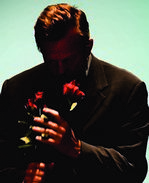SITE GUIDE
SEARCH
REVIEWS
REVIEW ARCHIVES
ADVERTISING AT CURTAINUP
FEATURES
NEWS
Etcetera and
Short Term Listings
LISTINGS
Broadway
Off-Broadway
NYC Restaurants
BOOKS and CDs
OTHER PLACES
Berkshires
London
California
New Jersey
DC
Connecticut
Philadelphia
Elsewhere
QUOTES
TKTS
PLAYWRIGHTS' ALBUMS
LETTERS TO EDITOR
FILM
LINKS
MISCELLANEOUS
Free Updates
Masthead
Writing for Us
A CurtainUp  London Review
London Review
 London Review
London ReviewDoktor Glas
|
Nothing so demeans or drags down a human being as the consciousness of not being loved.
— Doktor Glas
|

Krister Henriksson
(Photo: Mats Baeker) |
Of course this is a huge treat for Swedes in London and Krister Hendiksson enlivens his one man story with imitations of the troll like clergyman contrasting with his lovely young wife who seeks the doctor's advice as to how she can limit her husband's persistent and inconsiderate sexual demands. The actor's body language as the obnoxious Reverend Groothuis is creepy and obsequious. With a delicate female voice, Henriksson tells us, "I have developed a terrible loathing for my husband," and brings to life the pleas of the pastor's fragrant and beautiful wife.
Much of the narration, although it takes the form of the good doctor's journal, is like a dream, and Linus Fellbom's extraordinary lighting creates atmosphere and tension. A gauze curtain is drawn back to open the play and reveal the doctor's consulting room, simply decorated but dominated by a large silver light that you might find in an operating theatre. Light falls from the windows on one side of the room. At one point the whole stage is bathed in red light, a blood red backdrop for the description of a sinister dream he has about removing Reverend Groothuis' heart. The visuals are remarkable. Besides the lighting shifts, the doctor pulls papers from his desk drawer and the light cream papers float down in a shower, a dramatic and unforgettable moment.
Sadly, to take in the surtitles you have to raise your eyes away from the actor, but I witnessed enough of his performance to be caught up in the nature of the obsession he felt for the young woman and her predicament. In true Scandinavian style, there are no good outcomes in this tragedy as the doctor has to live with the consequences of his actions and the woman's youthful, debt ridden suitor Klas Recke meets and falls in love with another woman and then is "surprised to learn that she is very rich."
The language too surprises: whether it's the description of the sound of the old pastor walking on the gravel or Klas Recke having the "debts of a crown prince" or the explicit and anatomical piece of self reflection from Doctor Glas, "Why must our desire be quenched via that organ we use as a waste pipe?"
Dr Glas is an international production only too rarely seen in London.
|
Subscribe to our FREE email updates with a note from editor Elyse Sommer about additions to the website -- with main page hot links to the latest features posted at our numerous locations. To subscribe,
E-mail: esommer@curtainup.comesommer@curtainup.com
put SUBSCRIBE CURTAINUP EMAIL UPDATE in the subject line and your full name and email address in the body of the message -- if you can spare a minute, tell us how you came to CurtainUp and from what part of the country. |
| Doktor Glas
by Hjalmar Soederburg Adapted by Allan Edwall Directed by Peder Bjurman and Krister Hendriksson Starring: Krister Henriksson Set designed by Peder Bjurman Costume Designer: Kartin Hoeg Musical Director: Leif Jordansson Lighting: Linus Fellbom Running time: One hour 30 minutes without an interval Box Office: 0844 482 5136 Booking to 11th May 2013 Reviewed by Lizzie Loveridge based on 18th April 2013 at the Wyndham's Theatre Charing Cross Road, London WC2 0DA (Tube: Leicester Square) |
|
REVIEW FEEDBACK Highlight one of the responses below and click "copy" or"CTRL+C"
Paste the highlighted text into the subject line (CTRL+ V): Feel free to add detailed comments in the body of the email . . . also the names and emails of any friends to whom you'd like us to forward a copy of this review. |




